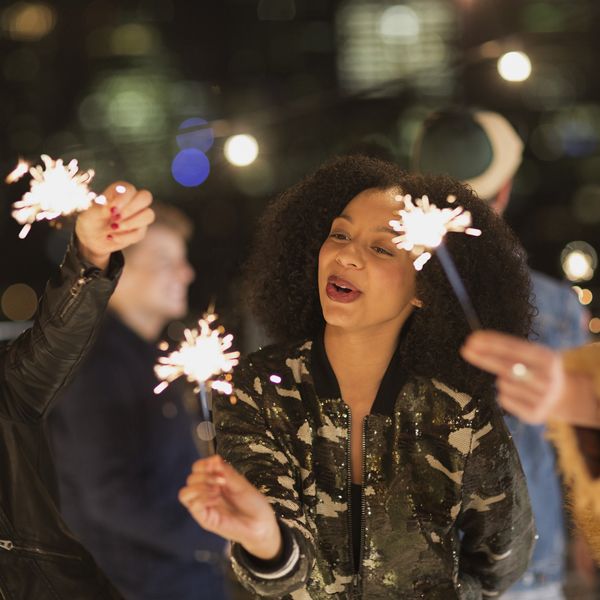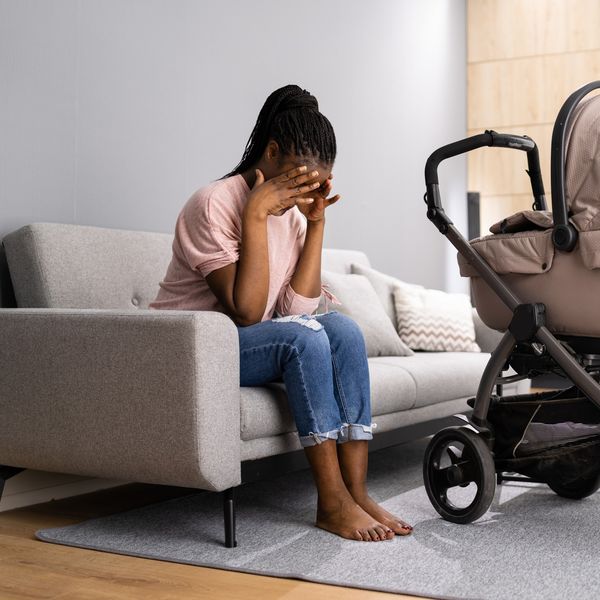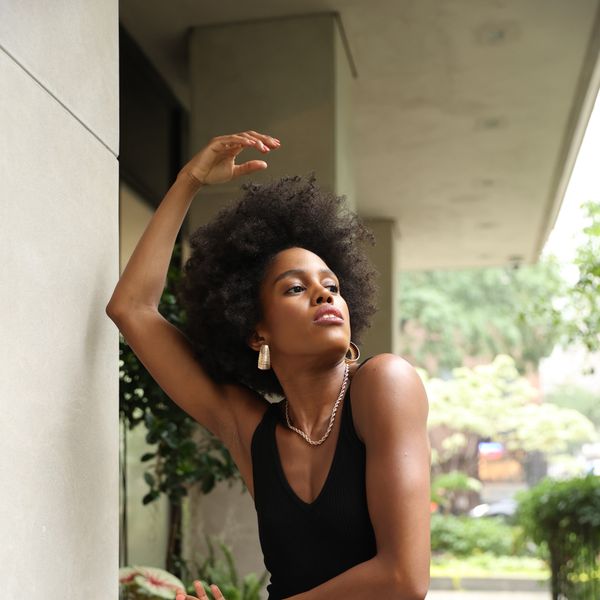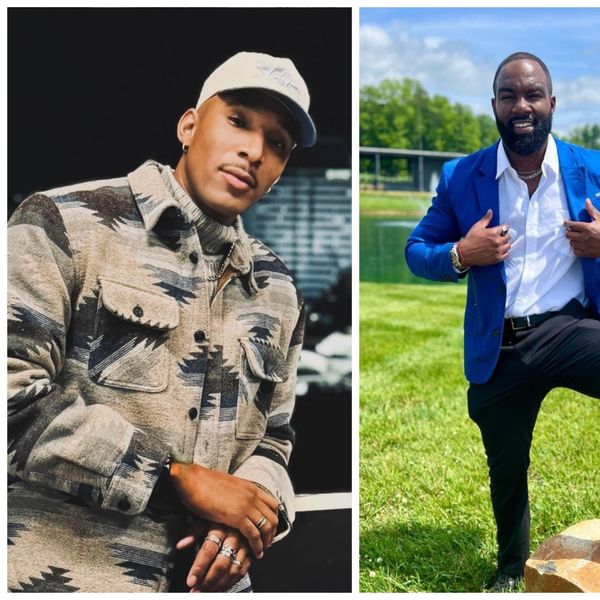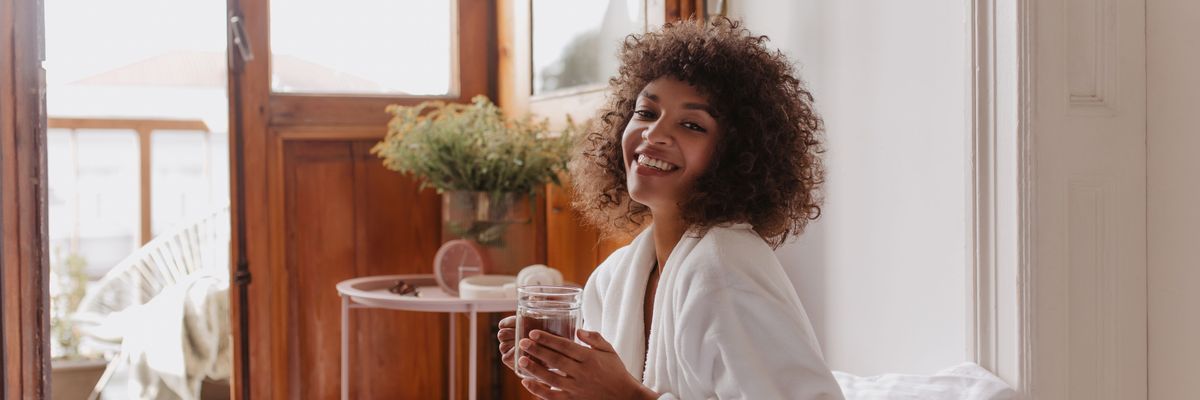Black K-Pop Fans Are Here To Tell You All About Their Lit Fan Community

Call me old, and maybe I am, but I'm just now learning about the world of K-pop, and the degree of which it is celebrated.
K-pop, short for Korean pop, is a popular music genre originating in South Korea that's basically taking the world by storm. It's highly influenced by styles and genres from around the world, such as rock, jazz, gospel, hip hop, R&B, reggae, electronic dance, folk, country, and classical, on top of its traditional Korean music roots.
One of the most impressive things about K-pop, is their loyal fanbase, reminiscent of the early 2000's boy band saga. And like so many others, there's a black following of listeners who have also gravitated to the movement, causing many of its artists to take note. For example, BTS, one of the more popular K-pop bands, took the initiative to show support and label themselves as allies by donating a million dollars to Black Lives Matter--ultimately encouraging their avid fanbase ARMY to match the donation. This was a huge gesture, considering there have been talks of anti-blackness in K-pop fandom.
The appeal is magnetic and we found some ladies willing to discuss just what that appeal is. Here are their stories:
Sequerstin | 23 | Memphis, TN

Courtesy of Sequerstin
I grew up living with my mom and my dad separately. My dad introduced me to the world of video games and anime. I was always the weird introverted cousin, preferring to be alone most of the time, and as my old English teacher would put it, "I was scarily quiet"--the biggest contrast to my loud, outspoken family. My interest in mostly pop and anime made me stand as well. I felt like I didn't fit in--not just in my family, but the black community as a whole. I've grown to not be ashamed of it now.
I discovered K-pop on YouTube one random day. I was searching for Keri Hilson's "Pretty Girl Rock", but instead, I found nine Korean girls dancing to it. The actual music video of Girls' Generation was linked. I was super intrigued, so I clicked on it, and was sent to another one of their music videos. Before I knew it, I was in a hole watching the next music video and the next and the next. I had instantly become a fan.
I loved their choreography, the music, the concepts. It was so refreshingly different from Western artists. The fact that they train for years before they even debut shows on stage with each performance. They also have so many variety shows and you get to watch them doing the simplest of things: cooking or enjoying a water park. It's fun seeing them interact and grow.
Admittedly, I don't participate in the fandom as much as I used to when I was younger. Now, I just enjoy their music, watch performances, vote, and go. There's so many toxic fans, and a lot of them like to stir up drama, I see it up and down Twitter and in Facebook comments. It gotten pretty bad, honestly.
Not only did I sense anti-blackness from the genre, but also non-black K-pop fans. It's a sad world really. For instance, South Korea's beauty standards include pale skin (white as a ghost), skinny, v-shaped jawline, and high bridge nose. It speaks for itself. I've watched Korean variety shows where they made fun of an idol who wasn't as pale, saying they needed to bathe and scrub off the dirt.
When I saw that clip it made me wonder, "Well if they're dark then what am I?" Or "Will my idol consider me ugly?" Sometimes I think they forget international fans are watching, but they continue on or they just don't care.
There's so much cultural appropriation, yet I still read/watch videos of black people facing racism in Korea. International fans are referred to as "Koreaboos", meaning we're trying to be Korean. I can't speak for everyone because there are some out there who try, but most of us just enjoy the music and appreciate the culture. I do find their culture fascinating but never tried to participate myself. I watch from the sidelines.
Oh, and Western media likes to say we're young teenage fans, when a lot of us are grown grown.
At the moment, my favorite group is TWICE. Their concepts are very cutesy, which isn't common in America but it works for them. They're chemistry is amazing. Yes, they were put together by a company, but strong bonds is what keeps them going for so long. And every song they've put out—a bop.
As far as BTS donating to Black America, I'm proud of them. They do nothing but promote peace, loving yourself and others. This is coming from a group that is heavily influenced by black culture. Their discography includes R&B and rap/ hip-hop. They've had a lot of eyes on them since the Billboard Awards and it's only right they lead by example.
Akilah | 29 | Miami, FL

Courtesy of Akilah
I was a quiet and imaginative child. I was always creative and curious and loved putting and making things, but I was never confident to show who I was or be myself. I was the type of girl who followed what her brothers did; from TV shows I watched, all the video games I ever played, to the sports I later played, I grew to love because I was with my older and younger brother. From there, I became immersed into gaming, comics books, cosplay and anime and even falling in love with something that was considered not normal at the time, aka K-pop.
It was really easy for me to get into K-pop since I was already really into watching shoujo anime and listening to tons of J-pop and J-rock artists. But what really made that extra push, was getting into K-drama, or Korean Dramas (Boys Over Flowers, my first K-drama). That's what really opened my doors fully because I got curious to explore more of the music and culture.
K-pop is fun, K-pop is free. K-pop allows you be your best self. Beside the music and the videos, what really draws you in, is the idols themselves. A lot of them you could relate to being different and doing what makes you happy. With that I feel K-pop aids you to find a voice to inspire!
As a fan, I've honestly heard a lot of crazy stuff questioning my blackness. I have a few friends I have met over time from going to different K-pop events and concerts, but a lot of my closest friends are either curious about the music or simply just don't understand. I often hear from non-fans that I must be lost or the music does not speak a message or oftentimes people would jokingly say that "I'm gonna marry a Korean man" or "I fetishize them."
It is never the case.
I grew to understand who I am as a person and not let a language barrier be the factor as to why I can't listen to music. At the end of the day, music is music. And I LOVE music. My favorite K-pop artist would have to be the renaissance man himself, Jay Park! Jay Park really made a name for himself in South Korea with his music. He is a man with drive, a vision, and he keeps going and going. His hustle don't stop! PLUS, I was able to see him live in person and his performance was AMAZING! He carries so much stage presence and confidence. Who wouldn't love a man like that!?
Anyway, K-pop has seriously came a long way with understanding black culture and I feel like K-pop as an industry is still learning. I honestly felt when BTS donated the millions to Black America, it was expected.
BTS is about healing the world and being yourself and loving yourself. If you love yourself, it will heal others around you. I feel it was just of them to do what they did to help spread love and to aid those who need help and that love. Love heals.
Chelsea | 24 | Washington D. C.

Courtesy of Chelsea
I grew up in Plano, Texas, a suburb outside of Dallas. My brothers and I went to a predominantly white, Christian private school that I don't have fond memories of. I struggle to talk about it because I find myself trying to downplay my feelings, trying to "oh, it wasn't that bad" myself into oblivion, but growing up like that was hard. I never felt like a person, I always felt like an Other. I felt unseen and unheard and alone, more often than not. And when I did feel "seen", it was when I was being tokenized, or used, or paraded like a show pony at a circus. "Look at how smart/kind/sweet/articulate/well-spoken she is!" white people would exclaim, as if I was an anomaly. It was weird. It's still weird.
In the summer of 2011, I was up late one night on YouTube and I was recommended the music video for SHINee's "Lucifer". You know that moment when Alice jumps down the rabbit hole? That music video was it for me. I was hooked. I needed to hear every album they had ever released and see all of their music videos and watch all of their variety show appearances. But, at first, I resisted. I told myself that I couldn't like SHINee. I refused to download the song to my phone. I was already getting weird looks for the anime I watched at home and the manga that I brought with me to school. I knew my peers and my family thought the things I liked were strange and I told myself I didn't need the extra attention another unconventional interest would bring me.
Sad, right?
I don't remember when, exactly, I finally broke and downloaded the entire Lucifer album, but I'm glad I did. The music and the fandom and the friends I've made through it—I can't imagine these past nine years without any of it. Some of the most loving, genuine friends I have in this life I met because I was listening to K-pop on my phone in public or tweeting about it. The community, when it's good, is amazing.
As far as the music, I love it, of course. I've always been a boy band/girl band person. I loved B2K and *NSYNC, and when I listen to songs like EXO's "Growl" or "Bad Boy" by Big Bang, I get those 90's pop/R&B heartthrob vibes that I'm a sucker for. I love the music videos, too, and I love how conceptual K-pop is. How each album is an "era", and each era brings a new sound, new styling, new hair.
It's also fascinating to me on a scholarly level. Seeing the way Korean culture is being spread through K-pop and how it's interacting with/taking from Black culture is so intriguing to me. So much so that I wrote my senior thesis on it in undergrad!
People outside of fandom can say all sorts of crazy things. I've had people assume that I only like/date Asian men because I listen to Korean music, people insinuate that I'm not Black enough (or Black at all), that I'm weird, that I want to be Asian. And even within fandom, there are stereotypes. When I first got into K-pop, every time I found another person who liked it (which was a rare occurrence back then), when it came time to ask about who our favorite groups were, it was always assumed, every single time, that mine must be BigBang or 2NE1. Because if the black girl is into K-Pop, it must be the rap/hip-hop leaning stuff, right? Not the worst thing in the world, but a hurtful microaggression, nonetheless.
Actually, this is disheartening to admit, but anti-blackness is something I expect from fandom spaces and music genres. K-pop is not exempt. I've seen Mamamoo in blackface, heard Zico drop the n-word, seen him wear confederate flags. Non-black K-pop fans like to appropriate AAVE to hype up their faves, and then turn around and call a black fan a racial slur or tell them to "go listen to rap music" when their opinions differ. It's ugly. It's hurtful. I have a hard time being active in fandom because of it and it sucks to feel like even my would-be happy place is full of anti-blackness.
With that said, I do think it's nice that BTS and Big Hit and other Korean artists like pH-1 and Jay Park and CL are donating and speaking out about the things that are happening to black people—I was especially pleased by CL's statement, where she acknowledged the K-pop industry is inspired by black culture and she encouraged fans and other artists to give and support and show love.
Black people deserve love and support (always, but especially now), and all the black artists that have passed through K-pop idols' lips when they're asked about what "inspiration" deserved their flowers. I am, however, concerned with performative donations with no action or change or any real heat or meaning behind them, but that's a concern that's not just limited to K-pop.
Feature image courtesy of Chelsea Irvin
- K-Pop Fans Defuse Racist Hashtags | The New Yorker ›
- K-pop fans emerge as a powerful force in US protests - BBC News ›
- The Traumatic Black Female Experience in K-Pop Fandoms ›
- K-pop fans flood social media to support Black Lives Matter - Los ... ›
- K-pop fans take over anti-Black hashtags with memes and fancams ... ›
- Black K-pop fans continue to face racism online - The Verge ›
- How K-Pop Fans Actually Work as a Force for Political Activism in ... ›
- Why Obsessive K-Pop Fans Are Turning Toward Political Activism ... ›
This Is How To Keep 'Holiday Season Stress' From Infecting Your Relationship
Hmph. Maybe it’s just me, but it seems like there is something really weird happening in the fall season air (because winter doesn’t officially begin until December 21) that cuddle season is in full swing while break-up season is as well. In fact, did you know that break-ups are so popular during the holiday season that December 11 is deemed Break-Up Day?
The reasons why relationships shift around this time vary; however, I did both roll my eyes and chuckle when I read that a very popular one is because it’s an easy way to get out of getting one’s significant other a Christmas present. SMDH.
Anyway, I personally think that the less shallow folks out here may contemplate calling things “quits” or they at least distance themselves a bit from their partner (and what I’m referring to is serious relationships) due to all of the stress and strain that oftentimes comes with the holidays whether it be financial, familial, due to their tight schedules or something else.
Listen, I would hate for you and your man to miss the fun and happiness of experiencing this time of year, all because you are so overwhelmed or irritated that you can’t really enjoy it. That’s why I have a few practical tips for how to avoid allowing the typical holiday season stress from INFECTING your relationship.
Manage Your Expectations
 Giphy
GiphyUnmanaged expectations. If there is a main reason why the holiday season tends to be so stress-filled for so many people, I’d bet good money that this is the cause. And when you’re in a long-term relationship, expectations can manifest themselves in all sorts of cryptic and/or unexpected ways. You might have relatives who assume that you are going to be with them for Thanksgiving or Christmas when you have other plans in mind. You might be thinking that you are going to spend one amount for presents while your man is thinking something totally different. When it comes to scheduling, your signals may be crossed.
And you know what? To all of these scenarios, this is where clear and consistent communication come in. Don’t assume anything. Don’t dictate anything either. From now until New Year’s, mutually decide to check in once a week, just to make sure that you are both on the same page as it relates to the holidays and what you both are thinking will come along with it. The less blindsided you both feel, the less stressed out you will be. Trust me on this.
Set (and Keep) a Budget
 Giphy
GiphyOkay, so I read that last year, 36 percent of Americans incurred some type of holiday-related debt. Hmph. Last year, there was still some sense of normalcy in this country, chile, so I can only imagine what finances are gonna look like over the next several weeks. That said, since I don’t know a lot of people who don’t find being broke stressful, make sure that you and your bae set a budget and then stick to it this year — no ifs, ands or buts.
Because really, y’all — it doesn’t make sense to deplete savings and/or max out credit cards for a few days of giggles only to be damn near losing your mind because you don’t know how to make ends meet come Dr. Martin Luther King, Jr. Day.
And by the way, this tip doesn’t just speak to things like food and gifts; I also mean travel. If it doesn’t make a ton of sense (or cents) to be all over the place this year — DON’T BE.
Keep Matthew 5:37 at the Forefront
 Giphy
GiphyIf off the top of your head, you don’t know what Matthew 5:37 says, no worries, here ya go: “But let your ‘Yes’ be ‘Yes,’ and your ‘No,’ ‘No.’ For whatever is more than these is from the evil one.” That verse right there? Oh, it’s a boundaries lifesaver! I say that because do you see “maybe” or “I’ll think about it” in there? Nope. LOL. It says that you should tell people “yes” or “no” and leave it at that — and that complements Anne Lamott’s quote, “’No’ is a complete sentence” impeccably well. Yeah, you’ve got to remember that anything beyond a yes or no to a request is privileged information; you don’t owe anyone details or an explanation.
Besides, if you are really honest with yourself, when someone asks you something and you give a “Umm, let me think about it” kind of reply, more times than not, you already know what your answer is going to be — so why not let you both off of the hook? Give your response. Commit to that. And let everyone (including yourself) get on with their lives and schedules.
I promise you that when it comes to those holiday parties, you are pissing more folks off by not RSVP’ing or doing so and not showing up than just saying, “Thank you but not this year” off the rip.
Remember That Your Personal Space Is Privilege Not a Right
 Giphy
GiphyA friend of mine recently bought a new house and invited me over to come see it. He’s a single man with no children, so as I was taking in all of the space that he had, especially as I walked through his finished basement, I joked about relatives coming to live with him. “Hell no” and “absolutely not” were pretty much his immediate responses as he went on to say that some folks even had the nerve to be offended when he told them that he had no intentions on taking DNA in.
Ain’t it wild how people think that your stuff is their right? And yes, that brings me to my next point. Your home is your sanctuary space. If you want to host folks this year — cool. If not, ALSO COOL. Please don’t let folks (family included) guilt you into how they want you to act or even into what they would do if the shoe was on the other foot. You are not them — and as one of my favorite quotes states, “If two people were exactly alike, one of them would be unnecessary.” (A man by the name Larry Dixon said that.)
Hell, my friends? They know that I am good for sending them random things that they need or even want all throughout the year. Coming over to hang out at my pace, though. Uh-uh. Chalk it up to being a card-carrying member of the ambivert club yet I like keeping my living space personal — and I sleep like a baby, each and every night, for feeling that way.
Always remember that your space, your time, your resources, your energy and shoot, yourself period (including your relationship), are all things that are your own. You get to choose how, when and why you want to share them. The holiday season is certainly no exception.
Cultivate Some “You Two Only” Traditions
 Giphy
GiphyIt’s not uncommon for some couples to hit me up after the holiday season to “detox.” Sometimes it’s due to the financial drama (and sometimes trauma) that they experienced. Sometimes it’s because they allowed their relatives (especially in-laws) to get more into their personal business than they should’ve. More than anything, though, it tends to be because they didn’t get enough quality time together and so ended up feeling “disconnected.”
Please don’t let that happen. Listen, I’m not even a holidays kind of woman and yet, I will absolutely sit myself down with some hot chocolate and chocolate chip cookies to enjoy a Hallmark holiday film or two. Aside from the fact that most of them are lighthearted and sweet, I also like that they usually focus on couples loving on each other amidst all of the holiday beauty and ambiance — which is something that all couples should set aside some time to do.
Maybe it’s a vacation. Maybe it’s a staycation. Or maybe it’s my personal favorite, A SEXCATION. Whether it’s for a few days, the weekend or even overnight — don’t you let the holidays go by without setting aside time for you and your man to celebrate one another. Don’t you dare (check out “Are You Ready To Have Some Very Merry 'Christmas Sex'?”).
GET. SOME. REST.
 Giphy
GiphyI once read that 8 out of 10 people get stressed out over the holidays and 3 out of 10 lose sleep during to it — and when you’re stress-filled and sleep-deprived, that can absolutely lead to hypersensitivity, making mountains out of molehills and even not being in the mood for sex.
Your relationship can’t afford to go through any of this, so definitely make sure to prioritize rest. I don’t care how unrealistic it might seem during this time, sleep should never be seen as a luxury; it will always and forever be a great necessity.
That said, try to get no less than six hours of shut-eye in (check out “6 Fascinating Ways Sex And Sleep Definitely Go Hand In Hand”) and even ask your bae to take a nap with you sometimes (check out “Wanna Have Some Next-Level Sex? Take A Nap, Sis.”). Not only will sleep help to restore your mind, body and spirit but, when it’s with your partner, it’s an act of intimacy that can make you both feel super connected, even in the midst of what might feel like chaos.
___
Holiday season stress is real. Still, never give it the permission or power to throw your relationship off. Put you and your man first and let the holidays be what they are gonna be, chile.
Let’s make things inbox official! Sign up for the xoNecole newsletter for love, wellness, career, and exclusive content delivered straight to your inbox.
Featured image by Shutterstock
Whew. Did you know that somewhere around 122 million Americans travel during the holiday season? Listen, I went to see my godbabies this past September and got caught up in a crazy ass traffic jam at BNA (the Nashville airport) that damn near has me considering air travel ever again — especially during this time of the year.
Besides, it’s not like it’s a written rule that you have to travel over the holidays. In fact, if you want to play it chill this year, why not enjoy a staycation instead? Although it might seem like it’s a “poor man’s compromise,” as you’re about to see, it actually…isn’t.
1. Go All Out with the Christmas Décor
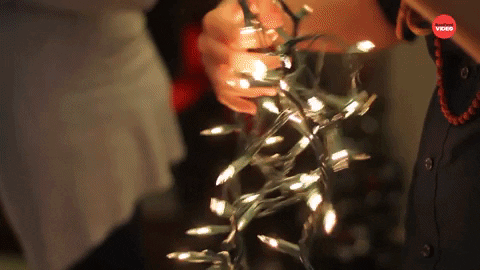 Giphy
GiphyThere is someone I know who is so obsessed with Christmas, she’s damn near annoying-borderline-terrifying. I’m. Not. Kidding. Yet hey, if you’re going to do a holiday-themed staycation (emphasis on “holiday-themed”), that’s kind of how you’ve got to be. Some décor ideas include:
- A fresh Christmas tree (is the most ideal) that is ultimately decorated
- Wreaths on outside and inside doors
- Garland (with twinkle lights) in predictable and unpredictable places
- Poinsettias
- Mistletoes
- Snow globes
- A stocking (with some of your favorite things in it)
- Fake snow
- Stars
- Angels
- Candy canes
- A BLACK Santa (LOL)
I mean, since you are going to be spending a lot of time at home, it can feel like a mini-winter wonderland if you are intentional about doing more decorating to your living space than you ever have before!
2. Buy a Couple of Christmas-Themed PJs
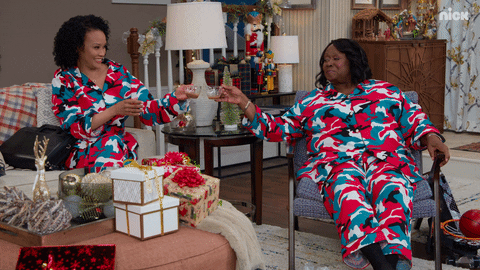 Giphy
GiphyWhile I was doing some research on a totally different topic, I happened upon an article that talked about the psychology behind why we should be intentional about what we wear to bed. When you stop to think about the fact that (hopefully) you are sleeping somewhere between 6-8 hours every night, it would make sense that things like the color and fabric of your sleepwear would have a real impact on you — even subconsciously.
Well, when it comes to Christmas décor, specifically, not only does it take you back to nostalgic memories, it can also boost your moods. So, aside from being on-10 with your Christmas décor, also invest in some Christmas-themed PJs. Since you’re going to be doing a lot of lounging around (RIGHT?), do it in something that makes you think about all of your favorite things about this time of year.
3. Cop Some Christmas-Scented Candles
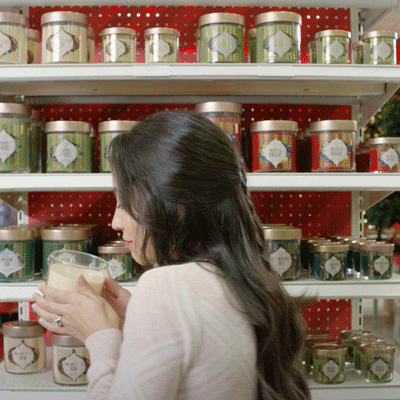 Giphy
GiphyThere really is no telling how many articles that I’ve written where I am singing the praises of scented soy candles. Candles are soothing, comforting and a very easy way to reduce stress. Also, since it gets darker quicker and for a longer period of time around this time of the year, candles provide a relaxing vibe to your home. Since it is Christmastime, go with scents that are reminiscent of the season:
- Cinnamon
- Vanilla
- Cranberry
- Apple
- Pine
- Frankincense and Myrrh
- Peppermint
- Cashmere
- Ginger(bread)
- Orange
- Sugar Cookies
- Sandalwood
- Cloves
- Cedarwood
- (Hot) Chocolate
Personally, one of my favorite candle companies is Goose Creek. Their signature collections will have your entire house smelling like a high-end bakery. No exaggeration.
4. Play Some Winter-Themed ASMR Sounds
 Giphy
GiphyI’m from Nebraska and my mother was a New Yorker. So, if there is one thing that I like, it’s seasons and that includes snow during wintertime. Unfortunately, Nashville is cray-cray when it comes to that. If, where you live, the weather is all over the place too (which is why I think it’s insane that some people still give pushback to global warming) and you would like for it to at least seem like you are in your own winter wonderland — invest in some fake snow to strategically place around your home.
Oh, and don’t forget to turn on some winter-themed ASMR sounds too. YouTube has videos that run for hours on end that feature blizzards and howling winds that really can make you feel like you are in the midst of an ice storm.
5. Host a Holiday Movie Marathon
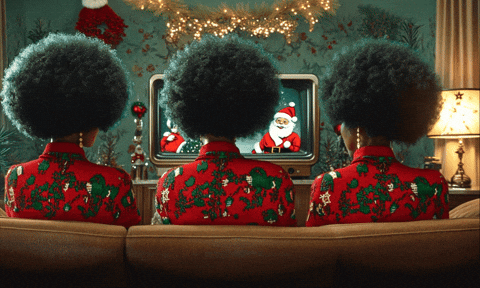 Giphy
GiphyOne thing to remember about a staycation is it doesn’t mean that you have to be alone or that the only people who can participate are the ones who live with you. Since a staycation is simply about staying close to home instead of traveling afar — absolutely consider having some of your favorite people over for a holiday-themed movie marathon. Shoot, Black America Web even did you a solid by publishing “25 Best Black Christmas Movies Of All Time;” plus, Tubi has a Black holiday hits section of indie films too.
Oh, and make sure to get creative with the Christmas-themed snacks. Some ideas? Some Kentucky-fried turkey tenders with cranberry hot sauce (recipe here), some Holiday Hot Spinach Dip (recipe here), some Grinch Kabobs (recipe here), some roasted pecans (recipe here) and some Pomegranate Guacamole (recipe here).
6. Spend a Night (or Two) at a Hotel or Vacation House
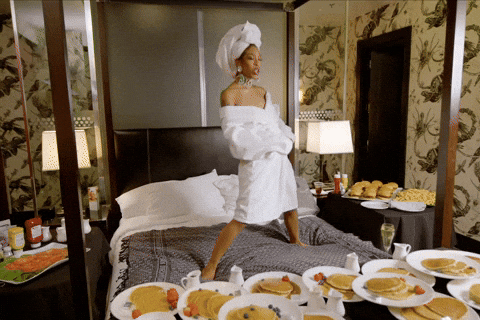 Giphy
GiphyJust like you don’t have to be alone during a staycation, you also don’t have to be cooped up in your house the entire time. Get a change of scenery in your own city by spending the night in a hotel that you’ve always wanted to try out or renting a vacation house for you and some of your folks to hang out in during the time between Christmas and New Year’s Day. I have a “love little sister” who does this randomly when she needs a break from her work as a therapist. She says that it’s damn near like taking a trip (and she has PLENTY of passport stamps; trust me).
7. Have Brunch or Dinner at a Christmas-Themed Restaurant
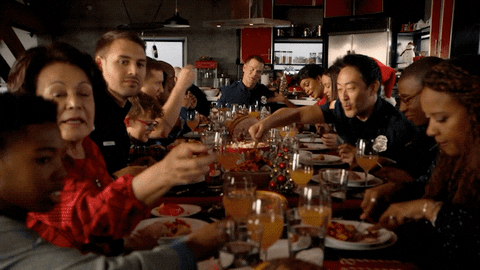 Giphy
GiphyIf nothing puts a bigger smile on your face than the thought of DoorDashing meals and barely even touching your stove during your staycation — hey, I am right there with you. Do consider going out to brunch or dinner during your chill time, though. It’s another way to bond with people and create some current holiday memories. And if you’ve got a bae and you opt for dinner, it can be a wonderful type of Christmas-themed date.
8. Go to a Holiday-Themed Concert
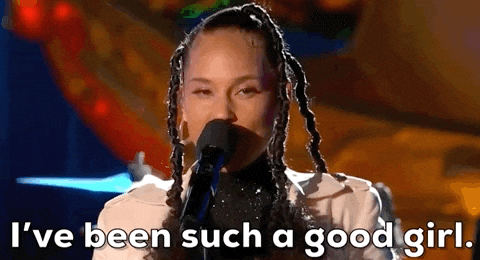 Giphy
GiphyBeing that I got my start as an entertainment writer, hear me when I say that I’m not someone who just has to go to a live concert every chance that I get. Oh, but baby, when I saw that El DeBarge was doing a City Winery tour and he was going to be here right before Christmas — I booked myself a ticket quick, fast and in a super-duper hurry! Shoot, I didn’t even want to go with someone because I plan to give him and that falsetto voice of his my complete and undivided attention. LOL.
I don’t know what it is about the holiday season that makes live music that much more enjoyable — but if there is a concert that features one of your favorite artists happening right through here, consider that to be a cool way to “tour your city” while cultivating a really awesome memory at the same time.
9. Also, Go Ice Skating
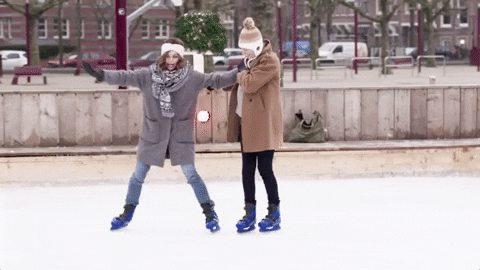 Giphy
GiphyOne of my fondest memories of time with my father is going ice skating. We actually would do it in the summer (because that is when I would visit him) and, every year, he would get me a new ice skating outfit. Even now, when I watch someone ice skate (even in movies; like in the classic movie Garden State), I will have warm fuzzies.
Anyway, if you’ve never been before, go. If it’s been forever since you have, also go. There is something that is very sweet and so signature Christmas about it. Plus, it’s a top-tier form of exercise.
10. Take a Christmas Lights Tour
 Giphy
GiphyAnother one of my favorite Christmas memories is driving through neighborhoods and looking at the Christmas lights. And just like a Christmas concert can be a form of hometown touring, so can doing this if you decide to choose a couple of areas where you’ve never really been or rarely frequent.
Now are you excited about the thought of experiencing a holiday-themed staycation?
I thought you would be. ENJOY!
Featured image by Shutterstock



